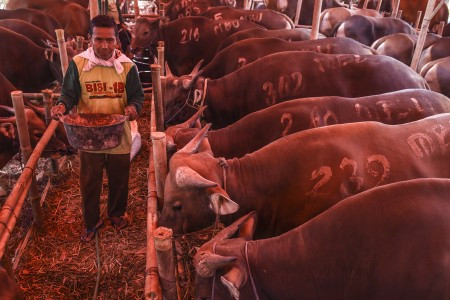Popular Reads
Top Results
Can't find what you're looking for?
View all search resultsPopular Reads
Top Results
Can't find what you're looking for?
View all search resultsMUI calls on Muslims to comply with health protocols during Idul Adha
To contain the spread of COVID-19, the Indonesian Ulema Council (MUI) has called on all Muslims nationwide to maintain health protocols when celebrating and praying on Idul Adha (Day of Sacrifice), which falls on Friday.
Change text size
Gift Premium Articles
to Anyone
T
he Indonesian Ulema Council (MUI) has called on Muslims nationwide to adhere to health protocols as they celebrate Idul Adha (Day of Sacrifice), which is expected to fall on Friday.
Repeating previous calls from the Religious Affairs Ministry and Muslim groups, the MUI’s fatwa commission secretary, Asrorun Niam Sholeh, advised people living in areas at high risk of COVID-19 transmission to pray at home.
“Those living in considerably safer areas are allowed to perform mass prayers in mosques, but they must comply with strict health protocols. Use masks, perform wudhu [ablution rituals] at home, bring your own sajadah [prayer mat] and maintain physical distance,” he advised in a written statement on Tuesday.
“We need to focus on our health. If we are unfit or have preexisting conditions, it is advisable for us to pray from home.”
The Jakarta Bureau of Mental and Spiritual Education (Dikmental) warned of a potential large-scale spread of COVID-19 if worshippers ignored the call, as they would be in close contact with potential virus carriers.
“For people in red zones, please pray at home with your families. This is for our collective health and safety,” Dikmental head Hendra Hidayat said on Tuesday, as quoted by kompas.com.
According to the city’s COVID-19 website, corona.jakarta.go.id, 33 community units (RW) in Jakarta had been categorized as red zones as of July 23.
Red zones are determined based on an area’s incidence of COVID-19. Hendra said the 33 RWs in Jakarta had been designated Strict Control Areas (WPK).
People who wish to participate in congregational prayers are required to wear a mask and bring their own prayer mat. Children and the elderly, who are at high risk, are prohibited from participating.
Indonesia’s second largest Islamic mass organization Muhammadiyah has asked its followers not to hold public congregational prayers and, instead, to pray at home or in small neighborhoods groups under strict health protocols.
Religious Affairs Minister Fachrul Razi said the Grand Istiqlal Mosque in Central Jakarta, the largest mosque in Southeast Asia, would not hold Idul Adha prayers this year.
He said that while the renovation of the Istiqlal Mosque was almost complete, health protocols would have been too difficult to enforce because tens of thousands of worshippers typically arrived for the yearly service.
Those who wish to perform qurban (animal sacrifices) for Idul Adha have been asked to go to abattoirs to limit crowds during the ritual. In addition, the MUI has recommended that qurban be performed by professionals.
“We must pay attention to the cattle’s health,” Asrorun said, adding that the animals should meet the age and health requirements of the qurban.
Asrorun also called on qurban committees and religious institutions to distribute the qurban meat directly to those in need and to prevent large crowds from forming during the ceremony.
President Joko “Jokowi” Widodo has donated cattle to several regional administrations for the Idul Adha sacrifice.
The MUI previously voiced concern that distributing meat immediately after the slaughter could pose a health risk because of COVID-19. It suggested that qurban meat be canned or cooked as rendang before being distributed.
Despite persistent health concerns, Transportation Minister Budi Karya Sumadi has said there will be no ban on mudik (exodus) during Idul Adha.
Budi said he had asked all transportation operators to enforce the safety and health protocols established by the national COVID-19 task force circular on travel requirements.
“We’re striving to build public trust, [so people can] feel confident using public transportation such as buses, trains, planes and ships,” he said in a press release published on Tuesday.
The recent COVID-19 task force circular on travel stipulated that domestic travelers using public transportation were required to show negative polymerase chain reaction (PCR) or rapid test results from tests taken no more than 14 days before the date of travel.
Alternatively, travelers could show a symptom-free testimonial from a doctor if COVID-19 testing was not available in their area.










